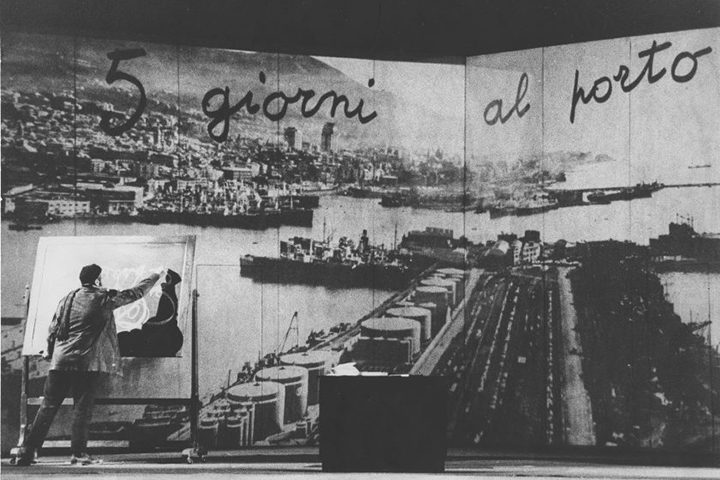Debutto: Genova, Politeama Genovese, 1 aprile 1969
| Regia | Luigi Squarzina |
| Regista assistente | Gianni Fenzi |
| Scene e costumi | Gianfranco Padovani |
| Musiche | Sergio Liberovici |
| Produzione | Teatro Stabile di Genova |
Personaggi e interpreti
A TORINO, 1923
| Luigi Einaudi, professore di Economia e legislazione industriale | Claudio Sora |
| Piero Gobetti | Giancarlo Zanetti |
| Un ispettore di polizia/studente | Mario Marchi |
| Studenti/studentesse | Mara Baronti Carla Bolelli Gianpiero Bianchi Alberto Carpanini Gianni De Lellis Edo Gari Maurizio Manetti Stefania Riccetti Sebastiano Tringali |
A GENOVA, 1900
I funzionari:
| Il prefetto, Camillo Garroni | Omero Antonutti |
| Il conte Cioia, ispettore del ministero degli Interni | Guido Lazzarini |
| Nicola Malnate, ispettore del porto | Maggiorino Porta |
| Un delegato di pubblica sicurezza | Mario Marchi |
I politici:
| L’onorevole Pietro Chiesa, socialista | Camillo Milli |
| L’onorevole Leonida Bissolati, socialista, direttore dell’”Avanti!” | Maurizio Manetti |
| L’avvocato Antonio Pellegrini, repubblicano | Claudio D’Amelio |
Gli operai:
| Ludovico Calda, tipografo | Eros Pagni |
| Alessandro Buratti, parrucchiere, segretario della Camera del lavoro | Edo Gari |
| Ricciotti Leoni, tipografo, segretario della Camera del lavoro | Gianni De Lellis |
| L’operaio del molo tre | Antonello Pischedda |
| L’operaio cattolico | Vittorio Penco |
| Il carbunin | Enrico Ardizzone |
| Il ferrà di Sampierdarena | Piercarlo Beretta |
| Il calafato | Mario Faralli |
| L’operaio ubriaco | Laerte Ottonelli |
| Un bambino | Adelmo Taddei |
| Un montanaro | Gianpiero Bianchi |
| Delegati e operai delle varie leghe: | Mara Baronti Gianpiero Bianchi Alberto Carpanini Sandro Dal Buono Renato Fassone Edo Gari Giorgio Grassi Andrea Montuschi Maggiorino Porta Sebastiano Tringali |
| L’emigrante veneta | Carla Bolelli |
La borghesia:
| Il finanziere | Daniele Chiapparino |
| L’industriale | Sandro Dal Buono |
| Il generale a riposo | Luigi Carubbi |
| Il capitano di lungo corso | Giorgio Grassi |
| La prima dama | Mara Baronti |
| La seconda dama | Stefania Riccetti |
| Il dandy | Gianpiero Bianchi |
| Il primo confidente | Mario Martini |
| Il secondo confidente | Mario Marchi |
I giornalisti:
| Luigi Einaudi, inviato della “Stampa” | Claudio Sora |
| Un giornalista | Alberto Carpanini |
A ROMA, 1901
| L’onorevole Giovanni Giolitti | Guido Lazzarini |
| L’onorevole Sidney Sonnino | Maggiorino Porta |
| L’onorevole Leonida Bissolati | Maurizio Manetti |
| L’onorevole Pietro Chiesa | Camillo Milli |
| L’onorevole Nicolò Fulci | Luigi Carubbi |
| L’onorevole Edoardo Daneo | Andrea Montuschi |
Scritto insieme con Vico Faggi, nel 1968, racconta le vicende del primo sciopero generale, nel 1900, in una città italiana, Genova, per protestare contro la chiusura della Camera del Lavoro. La messinscena rientra nella programmazione degli spettacoli storico-dialettici ideati da Squarzina per il Teatro Stabile di Genova con i quali affrontare i nodi della storia dell’Italia e i grandi temi ideologici e politici. Per Squarzina è un ritorno al tipo di impegno ideologico e politico della Romagnola. Il testo e lo spettacolo sono straordinariamente contemporanei perché nel 1968-69 c’è un’accentuazione delle lotte operaie, di scioperi generali e di agitazioni.
La commedia ha come riferimento il modello del teatro-documento, basato su una ricca e attentamente vagliata documentazione, ma non mortifica gli elementi spettacolari, espressi nell’invenzione scenica d’apertura, cioè la narrazione dei fatti affidata ad una lezione universitaria di Luigi Einaudi del 1923, nell’animazione della scena nuda attraverso proiezioni di foto d’epoca e nella recitazione in lingua integrata da una recitazione in dialetto genovese.
Lo spettacolo suscita il grande interesse dei portuali di Genova che assistono all’anteprima e ottiene un grande successo di critica e di pubblico in tutta Italia nella sua lunga tournée di due anni. Riceve il Premio Saint-Vincent.
 “… fu forse uno dei miei migliori spettacoli, vivacizzato dalla proiezione di foto d’epoca: fra l’altro, per la prima volta, feci vedere in un ingrandimento la pittura che poi in seguito è diventata molto nota, “Il quarto potere”, che è al comune di Milano”.
“… fu forse uno dei miei migliori spettacoli, vivacizzato dalla proiezione di foto d’epoca: fra l’altro, per la prima volta, feci vedere in un ingrandimento la pittura che poi in seguito è diventata molto nota, “Il quarto potere”, che è al comune di Milano”.
Luigi Squarzina
Tratto da E. Testoni, Dialoghi con Luigi Squarzina, Firenze, Le Lettere 2015, p. 186
Si ringrazia il teatro Nazionale di Genova per la concessione dell’utilizzo del materiale fotografico.

